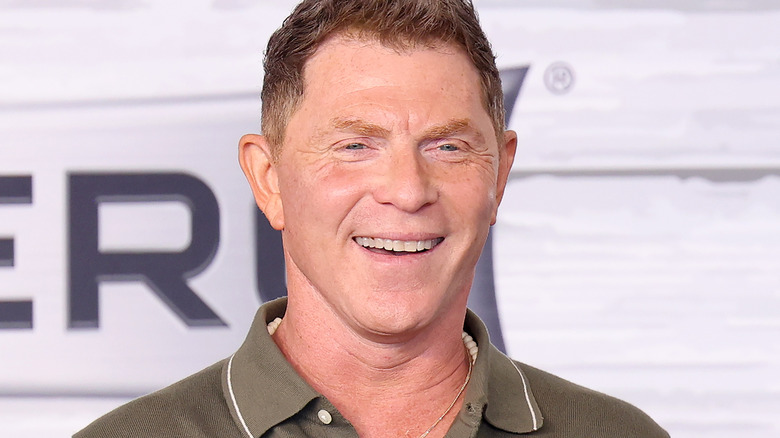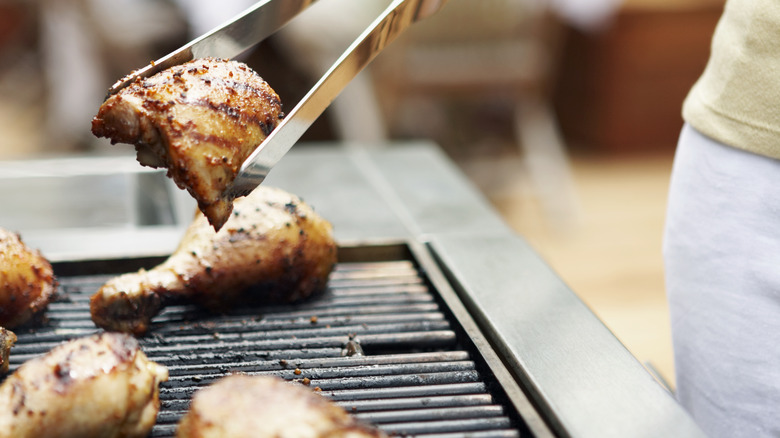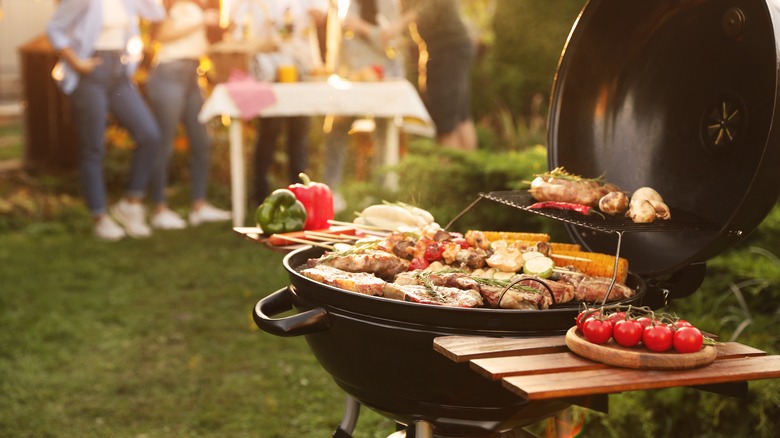Bobby Flay's Lid Tip To Avoid Burnt Food While Grilling
Few culinary experiences can compare to the delectable dishes that grilling can bring to the table. Whether you're doing it for a large outdoor gathering or yourself, this cooking method uses lots of heat to bring crispy exteriors and smoky flavors to both meat and vegetables. These high temperatures can cause foods to burn or tear, but thankfully, professional chef Bobby Flay has sound advice on how to avoid this problem. One of his best pieces of advice when grilling? Let the cooking time of your food dictate whether you keep the lid open or not.
Generally speaking, a grill's lid should be kept off for thin cuts of meat and vegetables that only require searing to cook thoroughly. Closing creates a convection current that more closely resembles the conditions of a hot oven, making it more ideal for thick, bone-in cuts of beef and larger pieces of chicken that require more time to finish up. More specifically, Flay leaves the lid on when cooking steaks and off when cooking small proteins like shrimp and quick-cooking vegetables.
Regardless of whether you decide to keep your grill open or not, Flay recommends using charcoal over gas during cooking. While the latter allows you to distribute heat more evenly, the former lets you infuse smokiness into your food, especially when coupled with a closed lid.
Don't mess with your food as it cooks on the grill
While grilling, it can be tempting to continuously poke, prod, and flip things as they sizzle over the burning charcoal. However, Bobby Flay advises against messing with your food too much as it cooks. Meats tend to stick to a grill until they have browned enough to flip. At best, touching too early can result in pieces of a steak or burger patties getting lodged on the grates; at worst, you could tear and lose the entire crispy skin on a chicken breast. You can check if your food's ready to flip with a pair of grilling tongs — if it doesn't come off the grates right away, leave it for a bit longer.
If you're still finding your food sticking to the grill, you might not be thoroughly drying it with a paper towel before cooking. Any excess surface moisture will cause your fish filets, steaks, and chicken breasts to bond to the grates they are sitting on, so make sure to pat them down prior to seasoning.
Keeping your grates clean and well-seasoned should minimize the chance of sticking, but you can prevent the issue by brushing your food with a coat of high-smoke point oil. Do that, and you can follow Flay's traditional trick of pressing chicken down with a brick (to get crispy skin) without worrying the food won't come off the grill.
Other tips for grilling from Bobby Flay
Before you even begin grilling, Bobby Flay advises cooking with large, rather than small, pieces of food. Bigger sizes of meat and vegetables will prevent things from falling into the hot, dirty charcoal and becoming inedible, especially if the spaces between your grates are wide. If you're trying to grill small ingredients such as shrimp, tomatoes, or brussel sprouts, use a water-soaked wooden or steel skewer to prevent losing your dinner. Keeping proportions on the larger side will also help your food take longer to cook (and thus, prevent accidental burning), so don't chop anything up until it's ready to serve.
Inevitably, you may run into a situation where you won't have enough time to marinate meats hours in advance before grilling. For these scenarios, Flay recommends embracing a spice rub or finishing spread to liven up the flavors of your cookout. If you're really short on time and in need of some inspiration, Flay likes to keep a jar of spicy, store-bought barbecue sauce in his pantry. This condiment alone is ready to use and should be enough to take any grilled meat to the next level, but you can add complexity with a dash of lime juice to balance out the richness of your food with acid.



